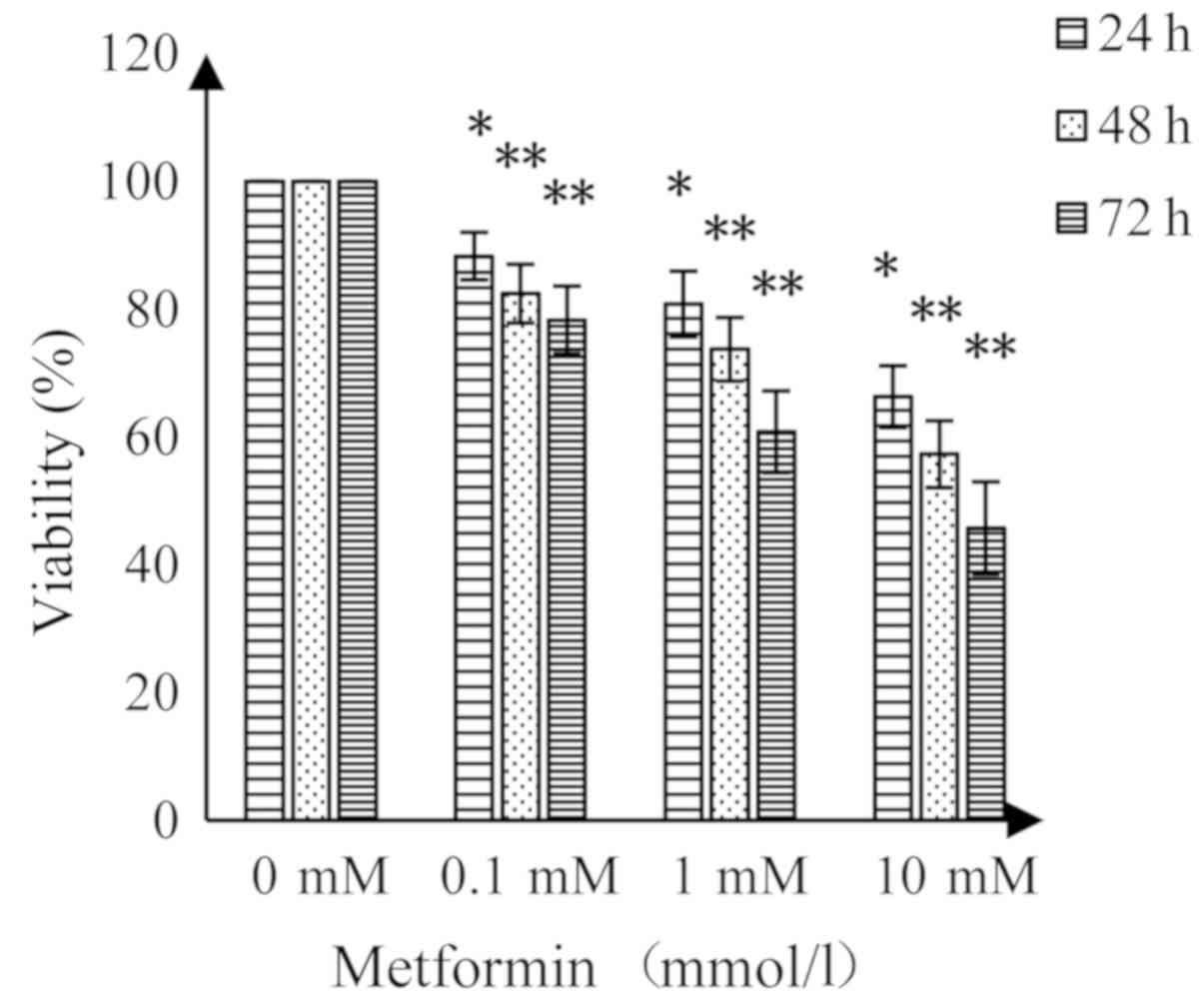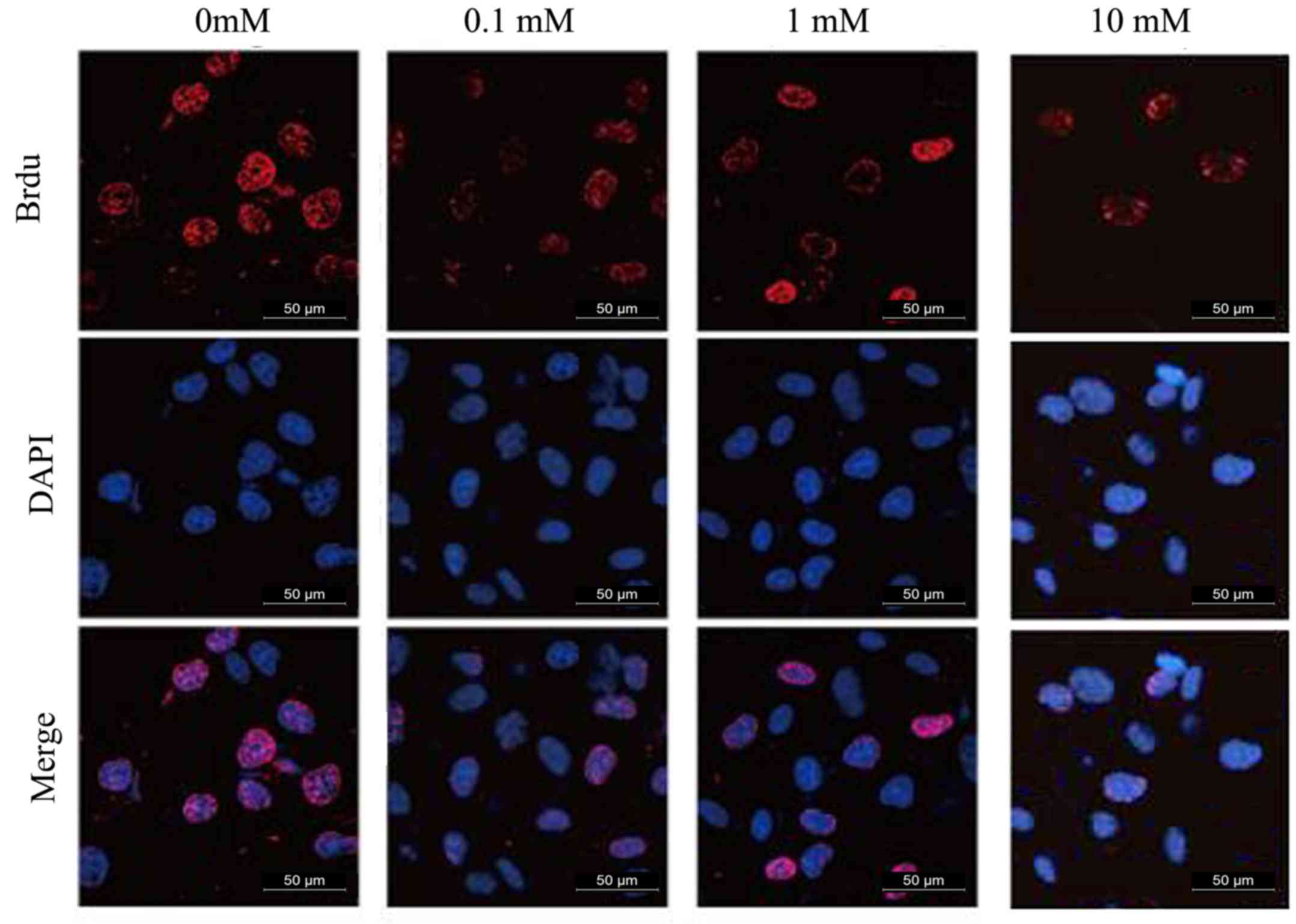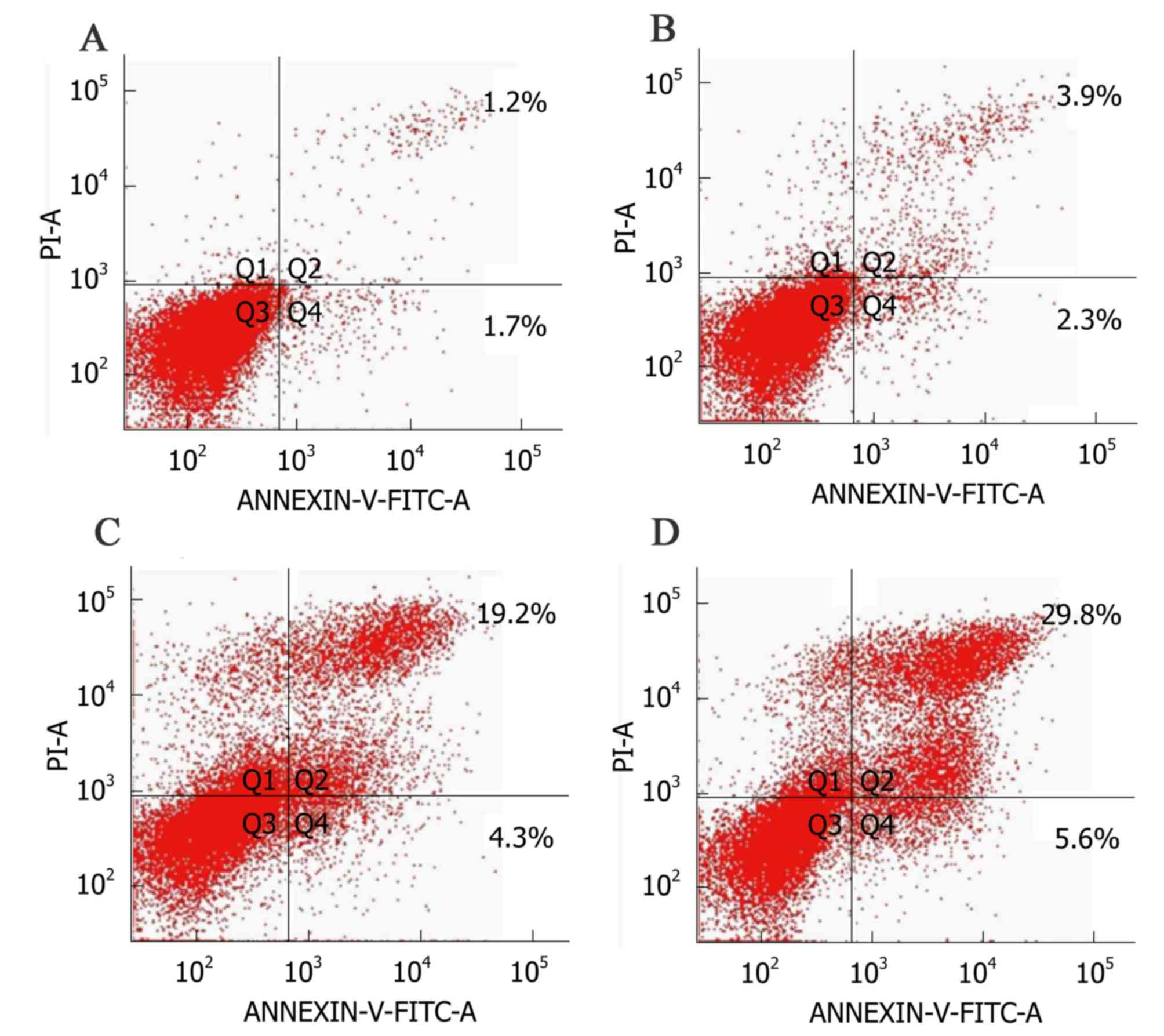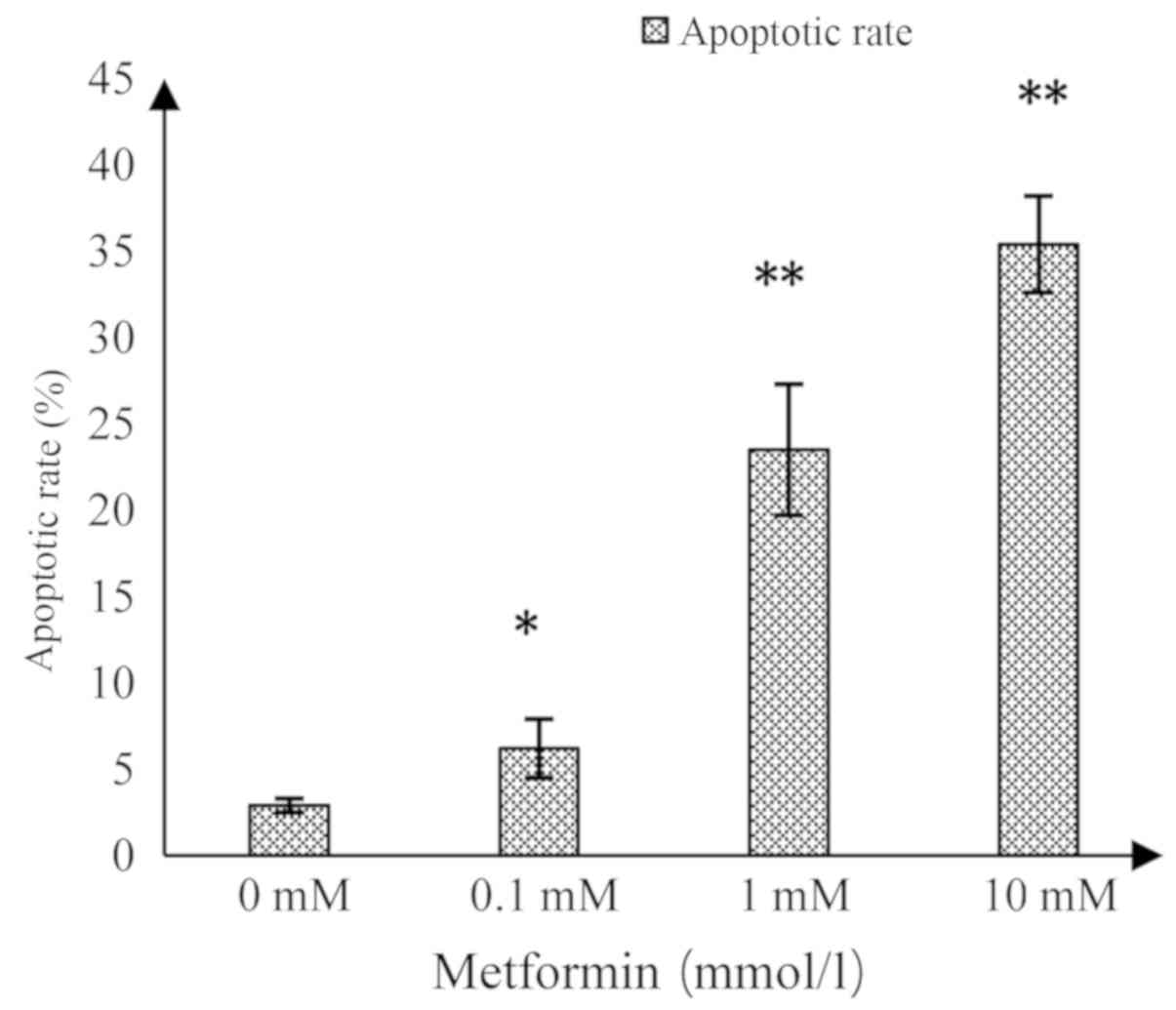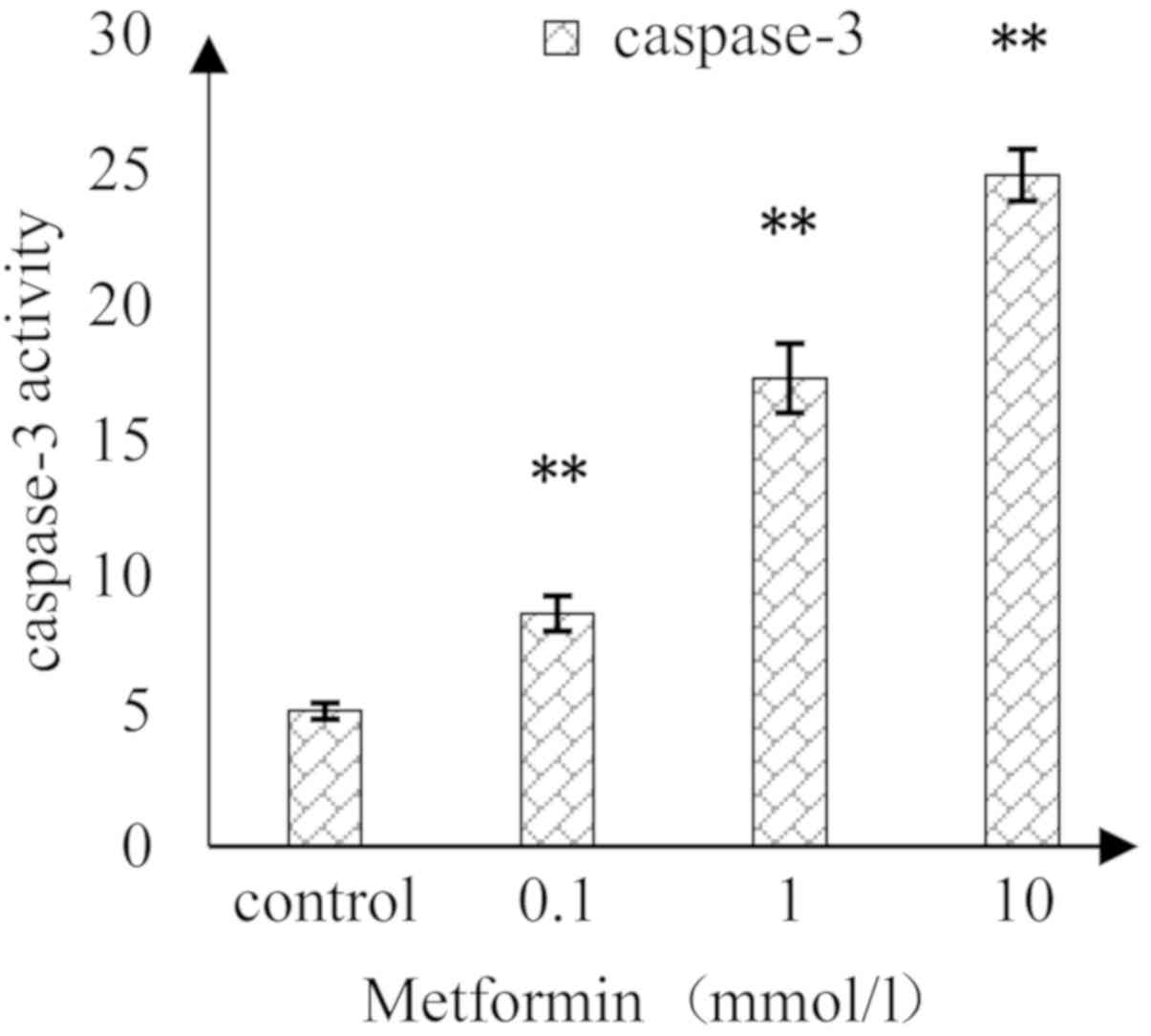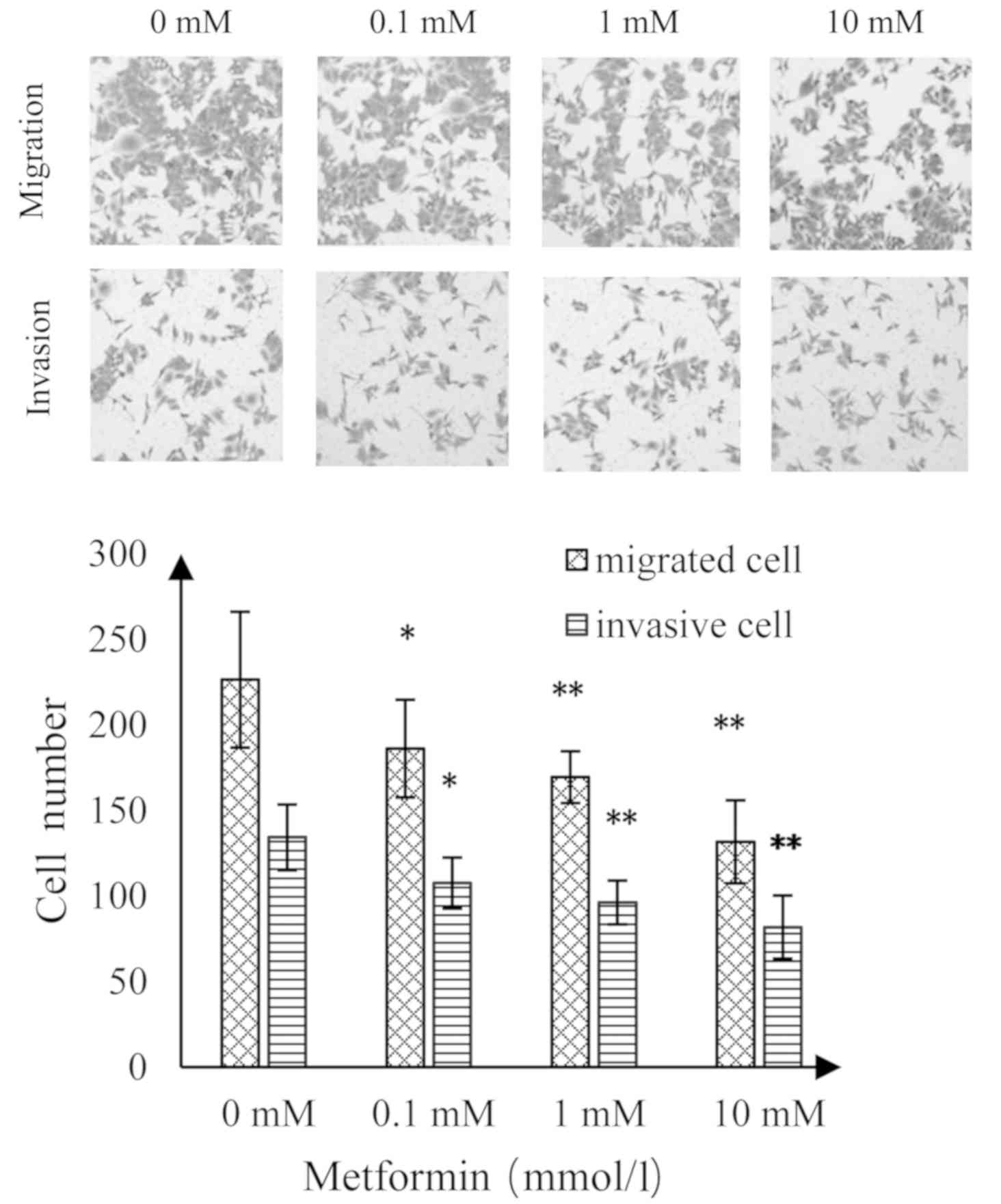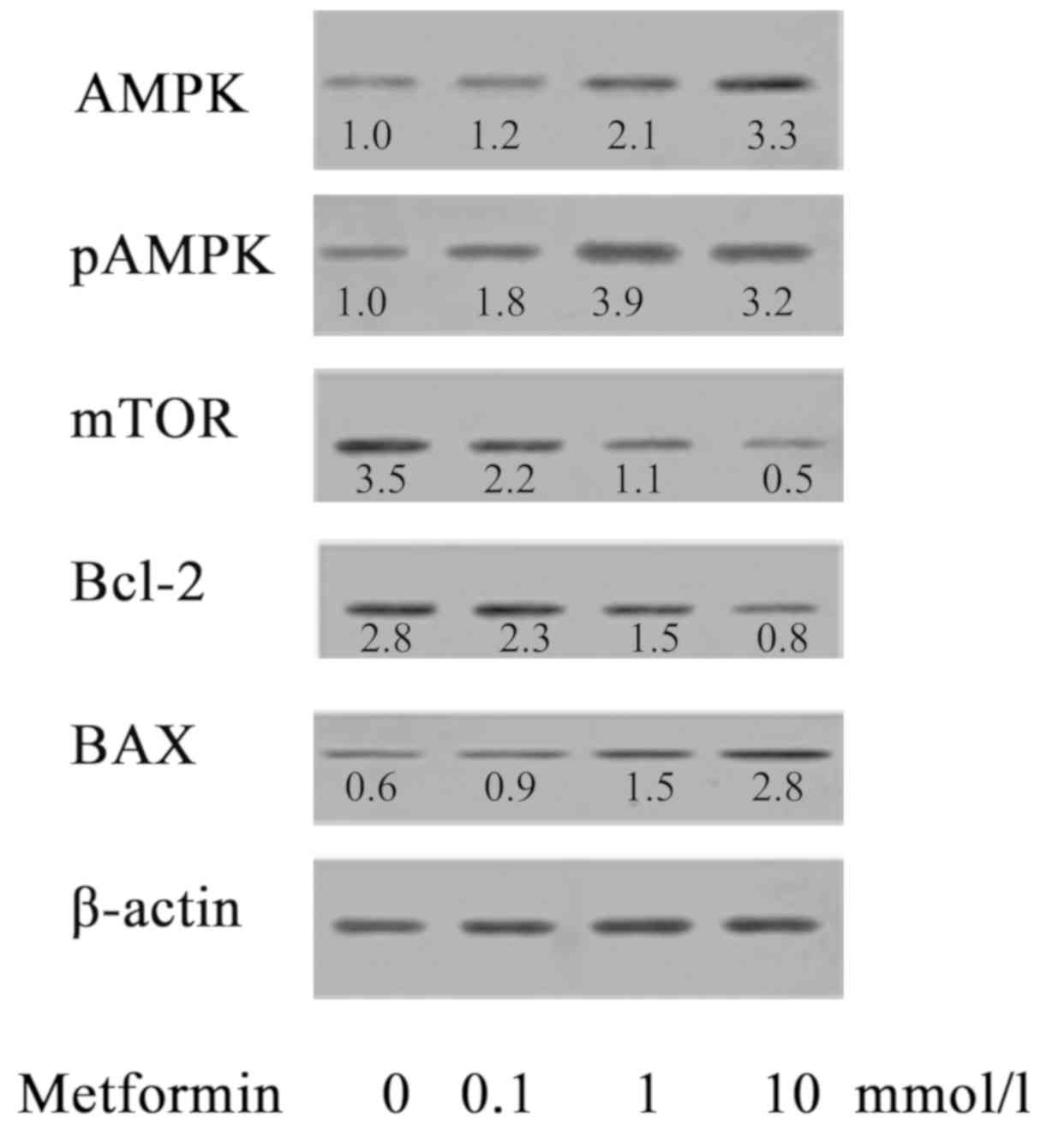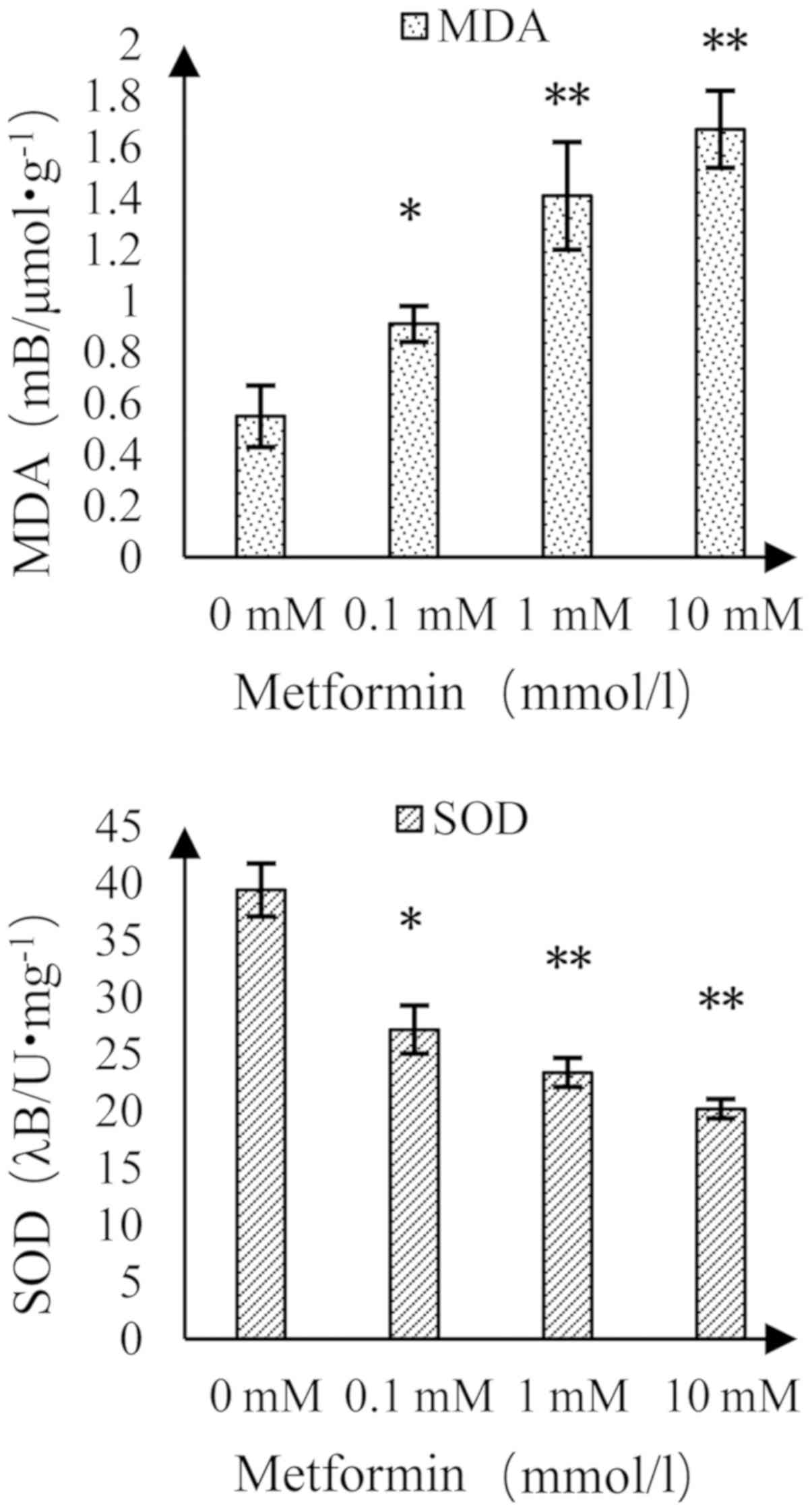|
1
|
Ostrom QT, Gittleman H, Stetson L, Virk SM
and Barnholtz-Sloan JS: Epidemiology of gliomas. Cancer Treat Res.
163:1–14. 2015. View Article : Google Scholar : PubMed/NCBI
|
|
2
|
Farmer RE, Ford D, Forbes HJ, Chaturvedi
N, Kaplan R, Smeeth L and Bhaskaran K: Metformin and cancer in type
2 diabetes: A systematic review and comprehensive bias evaluation.
Int J Epidemiol. 46:7452017. View Article : Google Scholar : PubMed/NCBI
|
|
3
|
Li C, Xue Y, Xi YR and Xie K: Progress in
the application and mechanism of metformin in treating non-small
cell lung cancer. Oncol Lett. 13:2873–2880. 2017. View Article : Google Scholar : PubMed/NCBI
|
|
4
|
Yousef M and Tsiani E: Metformin in lung
cancer: Review of in vitro and in vivo animal studies. Cancers
(Basel). 9(pii): E452017. View Article : Google Scholar : PubMed/NCBI
|
|
5
|
Whitburn J, Edwards CM and Sooriakumaran
P: Metformin and prostate cancer: A new role for an old drug. Curr
Urol Rep. 18:462017. View Article : Google Scholar : PubMed/NCBI
|
|
6
|
Rêgo DF, Elias ST, Amato AA, Canto GL and
Guerra EN: Anti-tumor effects of metformin on head and neck
carcinoma cell lines: A systematic review. Oncol Lett. 13:554–566.
2017. View Article : Google Scholar : PubMed/NCBI
|
|
7
|
Zhou PT, Li B, Liu FR, Zhang MC, Wang Q,
Li YY, Xu C, Liu YH, Yao Y and Li D: Metformin is associated with
surival benefit in pancreatic cancer patients with diabetes: A
systematic review and meta-analysis. Oncotarget. 8:25242–25250.
2017.PubMed/NCBI
|
|
8
|
Hankinson SJ, Fam M and Patel NN: A review
for clinicians: Prostate cancer and the antineoplastic properties
of metformin. Urol Oncol. 35:21–29. 2017. View Article : Google Scholar : PubMed/NCBI
|
|
9
|
Perez-Lopez FR, Pasupuleti V, Gianuzzi X,
Palma-Ardiles G, Hernandez-Fernandez W and Hernandez AV: Systematic
review and meta-analysis of the effect of metformin treatment on
overall mortality rates in women with endometrial cancer and type 2
diabetes mellitus. Maturitas. 101:6–11. 2017. View Article : Google Scholar : PubMed/NCBI
|
|
10
|
Samsuri NAB, Leech M and Marignol L:
Metformin and improved treatment outcomes in radiation therapy-A
review. Cancer Treat Rev. 55:150–162. 2017. View Article : Google Scholar : PubMed/NCBI
|
|
11
|
Zhou PT, Li B, Liu FR, Zhang MC, Wang Q,
Li YY, Xu C, Liu YH, Yao Y and Li D: Metformin is associated with
survival benefit in pancreatic cancer patients withdiabetes: A
systematic review and meta-analysis. Oncotarget. 8:25242–25250.
2017.PubMed/NCBI
|
|
12
|
Yu Z, Zhao G, Xie G, Zhao L, Chen Y, Yu H,
Zhang Z, Li C and Li Y: Metformin and temozolomide act
synergistically to inhibit growth of glioma cells and glioma stem
cells in vitro and in vivo. Oncotarget. 6:32930–32943. 2015.
View Article : Google Scholar : PubMed/NCBI
|
|
13
|
Seliger C, Meyer AL, Renner K, Leidgens V,
Moeckel S, Jachnik B, Dettmer K, Tischler U, Gerthofer V, Rauer L,
et al: Metformin inhibits proliferation and migration of
glioblastoma cells independently of TGF-β2. Cell Cycle.
15:1755–1766. 2016. View Article : Google Scholar : PubMed/NCBI
|
|
14
|
Seliger C, Ricci C, Meier CR, Bodmer M,
Jick SS, Bogdahn U, Hau P and Leitzmann MF: Diabetes, use of
antidiabetic drugs, and the risk of glioma. Neuro Oncol.
18:340–349. 2016. View Article : Google Scholar : PubMed/NCBI
|
|
15
|
Guigas B and Viollet B: Targeting AMPK:
From ancient drugs to new small-molecule activators. Exp Suppl.
107:327–350. 2016.PubMed/NCBI
|
|
16
|
Cheng J, Zhang T, Ji H, Tao K, Guo J and
Wei W: Functional characterization of AMP-activated protein kinase
signaling in tumorigenesis. Biochim Biophys Acta. 1866:232–251.
2016.PubMed/NCBI
|
|
17
|
Stopsack KH, Greenberg AJ and Mucci LA:
Common medications and prostate cancer mortality: A review. World J
Urol. 35:875–882. 2017. View Article : Google Scholar : PubMed/NCBI
|
|
18
|
Yang SH, Li S, Lu G, Xue H, Kim DH, Zhu JJ
and Liu Y: Metformin treatment reduces temozolomide resistance of
glioblastoma cells. Oncotarget. 7:78787–78803. 2016. View Article : Google Scholar : PubMed/NCBI
|
|
19
|
Liu X, Chhipa RR, Pooya S, Wortman M,
Yachyshin S, Chow LM, Kumar A, Zhou X, Sun Y, Quinn B, et al:
Discrete mechanisms of mTOR and cell cycle regulation by AMPK
agonists independent of AMPK. Proc Natl Acad Sci USA.
111:E435–E444. 2014. View Article : Google Scholar : PubMed/NCBI
|
|
20
|
Carmignani M, Volpe AR, Aldea M, Soritau
O, Irimie A, Florian IS, Tomuleasa C, Baritchii A, Petrushev B,
Crisan G and Valle G: Glioblastoma stem cells: A new target for
metformin and arsenic trioxide. J Biol Regul Homeost Agents.
28:1–15. 2014.PubMed/NCBI
|
|
21
|
Podhorecka M, Ibanez B and Dmoszyńska A:
Metformin-its potential anti-cancer and anti-aging effects. Postepy
Hig Med Dosw (Online). 71:170–175. 2017. View Article : Google Scholar : PubMed/NCBI
|
|
22
|
Du L, Wang M, Kang Y, Li B, Guo M, Cheng Z
and Bi C: Prognostic role of metformin intake in diabetic patients
with colorectal cancer: An updated qualitative evidence of cohort
studies. Oncotarget. 8:26448–26459. 2017.PubMed/NCBI
|
|
23
|
Zhao B, Wang X, Zheng J, Wang H and Liu J:
Effects of metformin treatment on glioma-induced brain edema. Am J
Transl Res. 8:3351–3363. 2016.PubMed/NCBI
|
|
24
|
Liu F, Yan L, Wang Z, Lu Y, Chu Y, Li X,
Liu Y, Rui D, Nie S and Xiang H: Metformin therapy and risk of
colorectal adenomas and colorectal cancer in type 2 diabetes
mellitus patients: A systematic review and meta-analysis.
Oncotarget. 8:16017–16026. 2017.PubMed/NCBI
|
|
25
|
Rukoyatkina N, Butt E, Subramanian H,
Nikolaev VO, Mindukshev I, Walter U, Gambaryan S and Benz PM:
Protein kinase A activation by the anti-cancer drugs ABT-737 and
thymoquinone is caspase-3-dependent and correlates with platelet
inhibition and apoptosis. Cell Death Dis. 8:e28982017. View Article : Google Scholar : PubMed/NCBI
|
|
26
|
Li H, Chen X, Yu Y, Wang Z, Zuo Y, Li S,
Yang D, Hu S, Xiang M, Xu Z and Yu Z: Metformin inhibits the growth
of nasopharyngeal carcinoma cells and sensitizes the cells to
radiation via inhibition of the DNA damage repair pathway. Oncol
Rep. 32:2596–2604. 2014. View Article : Google Scholar : PubMed/NCBI
|
|
27
|
Leidgens V, Proske J, Rauer L, Moeckel S,
Renner K, Bogdahn U, Riemenschneider MJ, Proescholdt M,
Vollmann-Zwerenz A, Hau P and Seliger C: Stattic and metformin
inhibit brain tumor initiating cells by reducing
STAT3-phosphorylation. Oncotarget. 8:8250–8263. 2017. View Article : Google Scholar : PubMed/NCBI
|
|
28
|
Pantovic A, Bosnjak M, Arsikin K, Kosic M,
Mandic M, Ristic B, Tosic J, Grujicic D, Isakovic A, Micic N, et
al: In vitro antiglioma action of indomethacin is mediated via
AMP-activated protein kinase/mTOR complex 1 signalling pathway. Int
J Biochem Cell Biol. 83:84–96. 2017. View Article : Google Scholar : PubMed/NCBI
|
|
29
|
Sesen J, Dahan P, Scotland SJ, Saland E,
Dang VT, Lemarié A, Tyler BM, Brem H, Toulas C, Cohen-Jonathan
Moyal E, et al: Metformin inhibits growth of human glioblastoma
cells and enhances therapeutic response. PLoS One. 10:e1237212015.
View Article : Google Scholar
|
|
30
|
Hall J, Prabhakar S, Balaj L, Lai CP,
Cerione RA and Breakefield XO: Delivery of therapeutic proteins via
extracellular vesicles: Review and potential treatments for
Parkinson's disease, glioma, and schwannoma. Cell Mol Neurobiol.
36:417–427. 2016. View Article : Google Scholar : PubMed/NCBI
|















